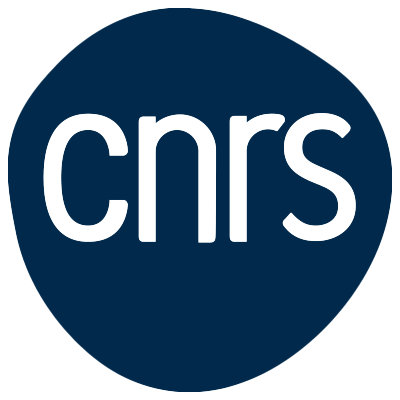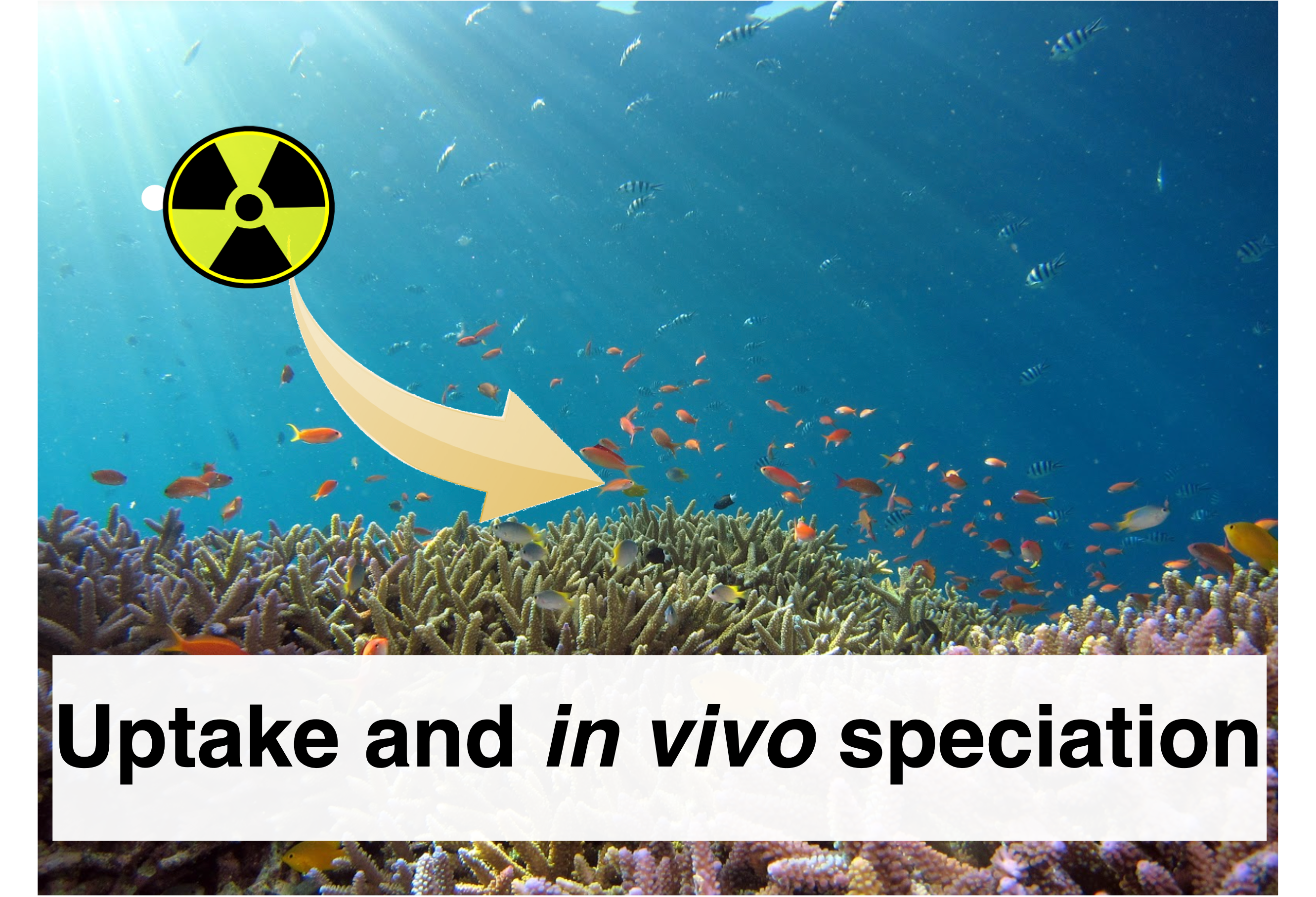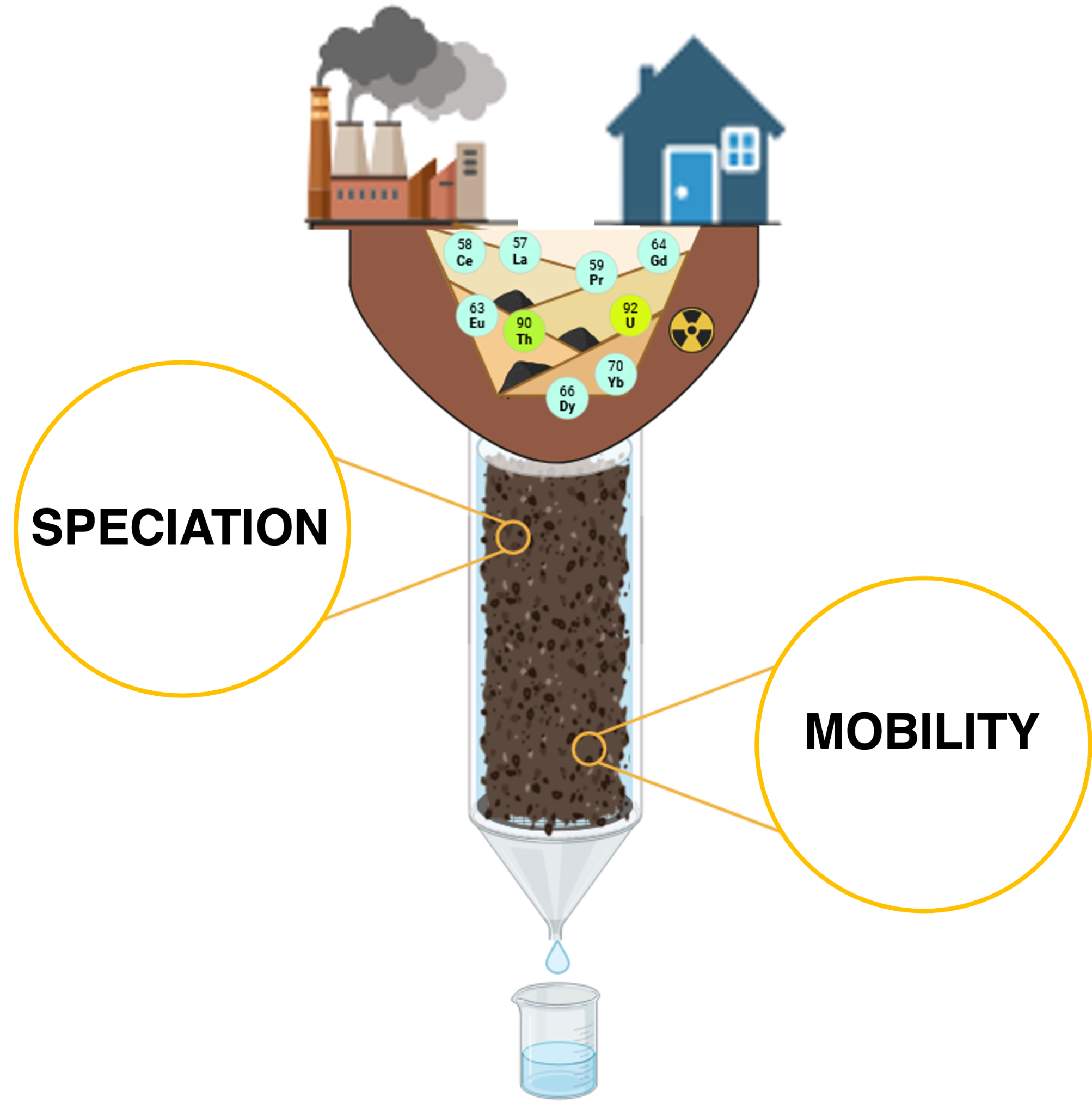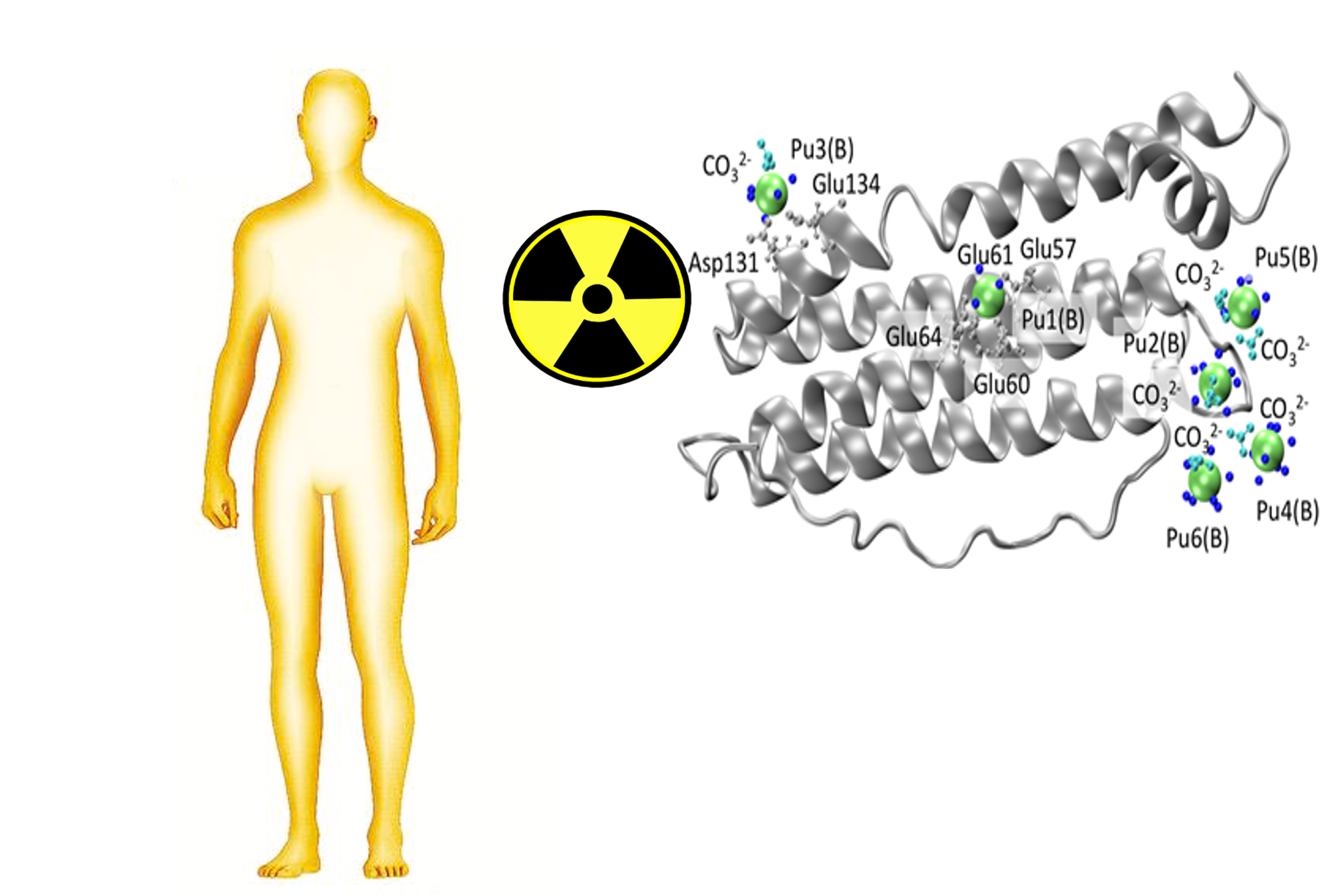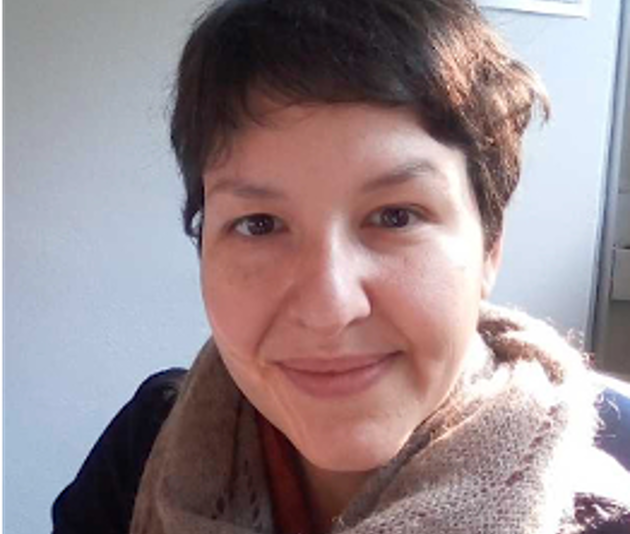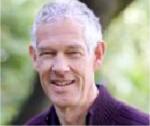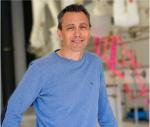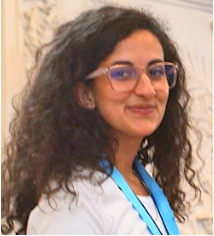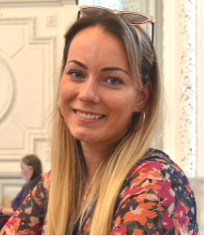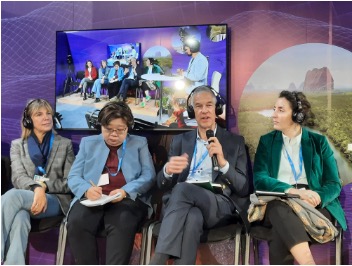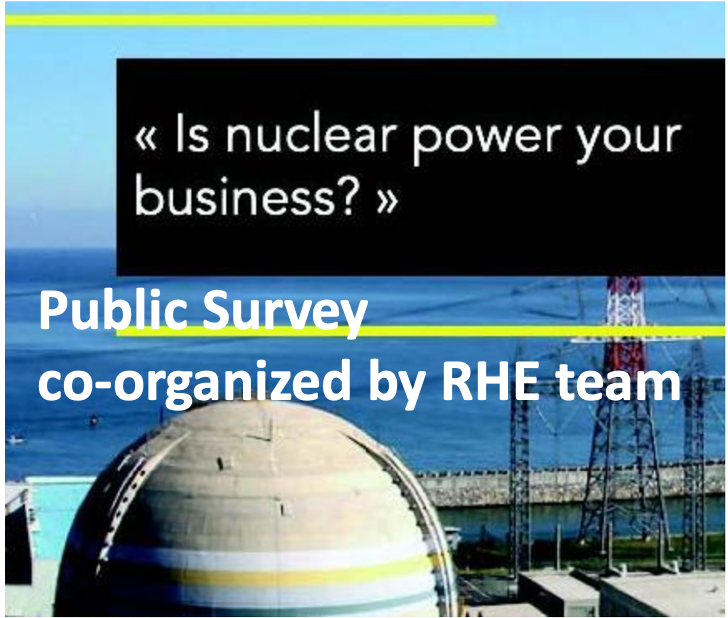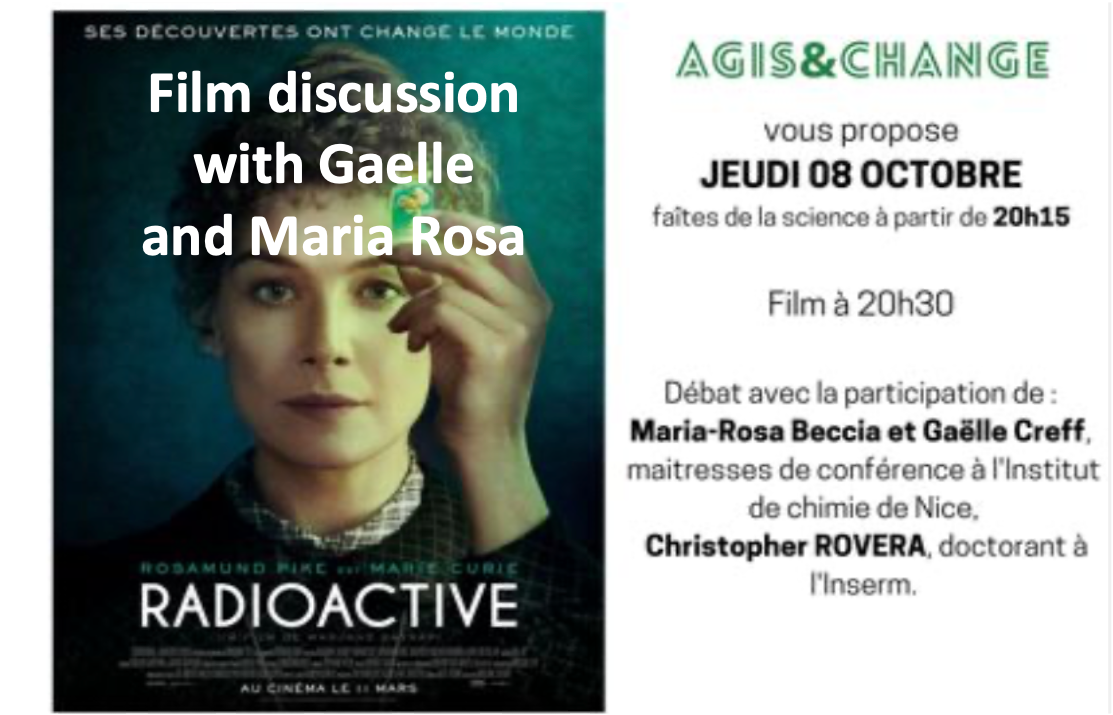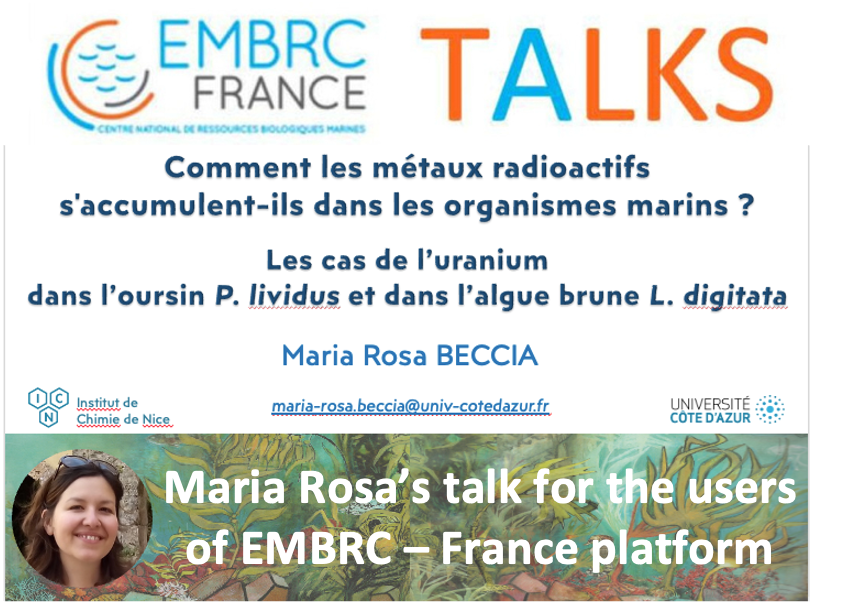Equipes de recherche
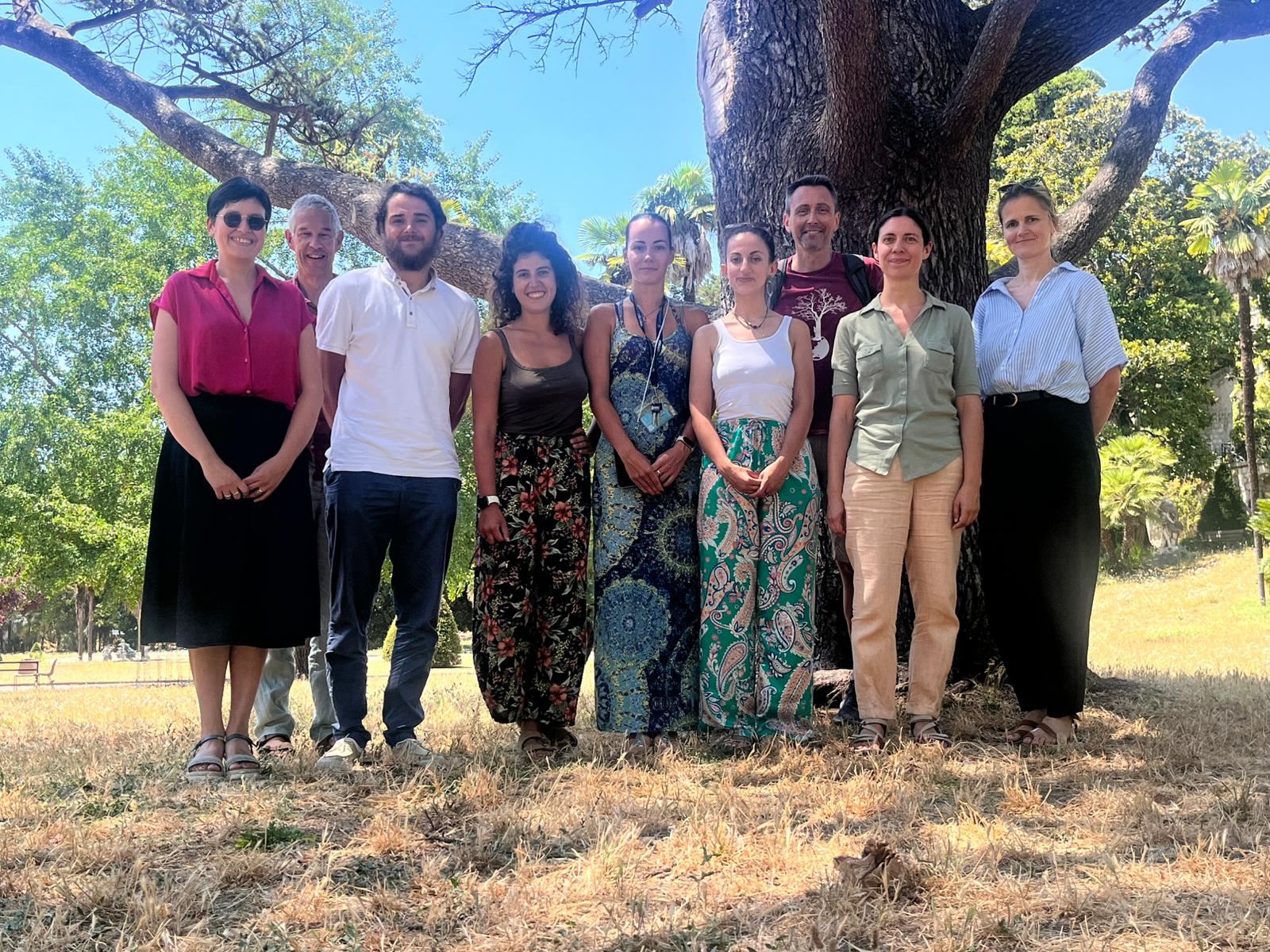
Coordinatrice: Dr. Maria Rosa Beccia
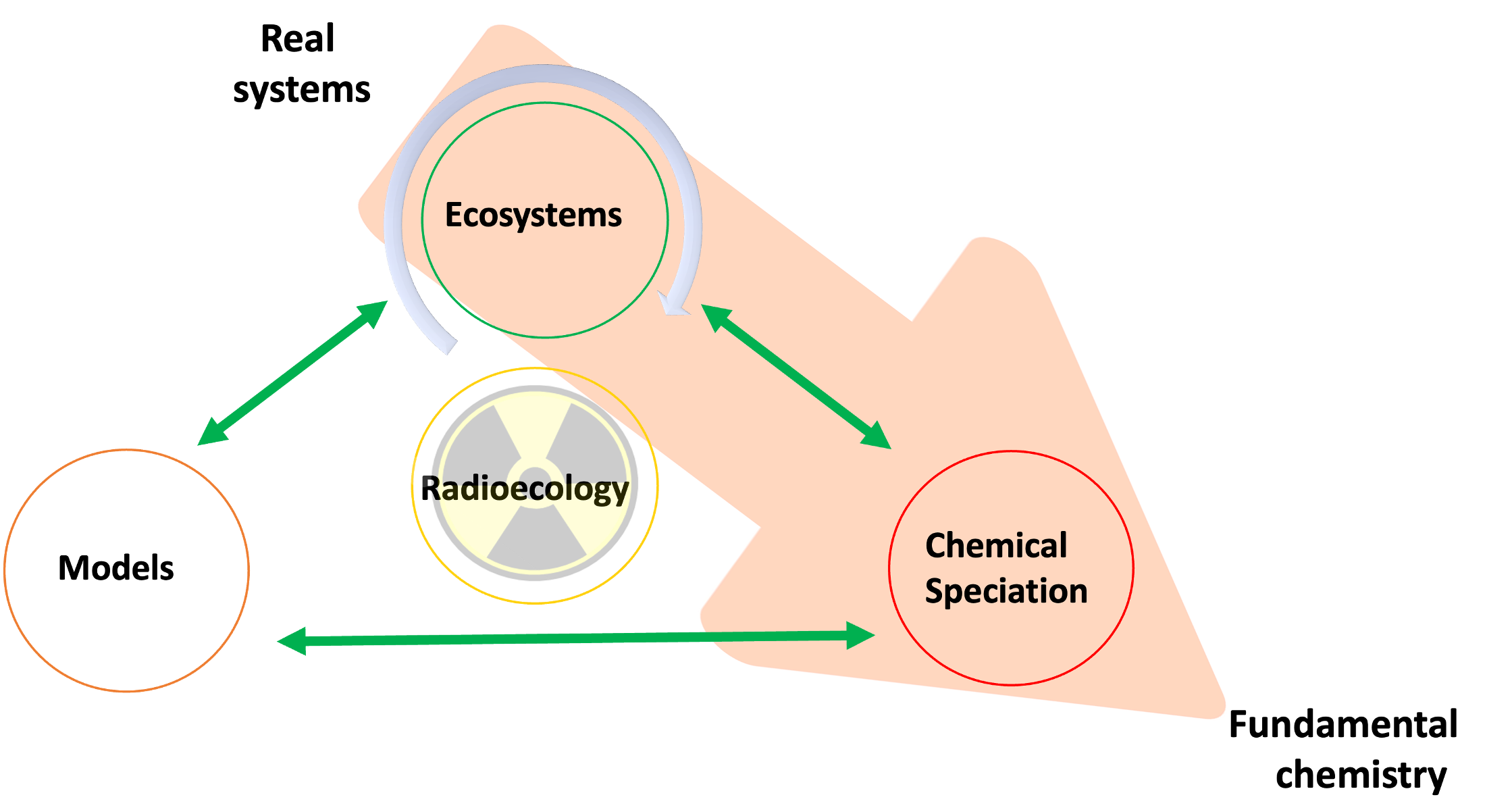
We investigate radionuclide chemical interactions with environmental matrices and living organisms. Using laboratory model ecosystems and advanced spectroscopic techniques, we explore the chemical mechanisms underlying radionuclide transfer to selected organisms and characterize their speciation in environmental and biological compartments. With our work, we aim to shift from descriptive global approaches to a mechanistic perspective on radioecology and provide a comprehensive insight into the consequences of radionuclide contamination.
- Research
-
marine Radionuclides in Marine Ecosystems
We investigate the effects of radionuclides on marine ecosystems, focusing on how these radioactive elements interact with marine organisms. Seawater is highly vulnerable to radionuclide contamination, exposing marine life to potential disruptions in biological processes. We study the uptake of radionuclides by key marine species, like macroalgae, mussels, sea urchins. This research aims to uncover the ecological risks of radionuclide contamination and improve our understanding of its long-term effects on marine environments.mining Naturally occurring radionuclides in mining contexts
Rare earth elements (RE) are essential for modern technologies, but their extraction generates significant radioactive waste containing uranium, thorium and radium. We investigate the environmental behavior and chemical speciation of these naturally occurring radioactive elements in mining tailings. Using a laboratory tailing model with natural soils and spectroscopic techniques, we aim to assess the mobility of U, Th, and Ra under controlled conditions and contribute to the sustainable management of RE mining in fragile ecosystems.human Human nuclear toxicology
Actinides, like uranium (U) or plutonium (Pu), tend to accumulate in the skeleton, making bones a key target for contamination and raising concerns for human health. To uncover how these toxic metals affect our bodies, we study the molecular mechanisms through which actinides interact with the bone matrix and may alter its function. We also explore the fundamental interactions between actinides and proteins, as their presence can disrupt the three-dimensional structure of these biomolecules and alter their activity. By investigating these processes, we aim to uncover the molecular basis of actinide toxicity and its effects on human health. - Group members
-
MR CDA GC HM AJ Dr. Aurélie Jeanson
Research engineer CNRS
Radiation Safety Officer
mailMR PhD Students
belkessa
Nawel Belkessa
Molecular approach of uranium and neptunium accumulation in bivalve mollusks
mailMR plasajec
Ana Plasajec
Chemical mechanisms in radioecology: cesium in bivalve mollusks
mailMR - Publications
-
2024
- Sci. Total. Environ. Assessing the chronic effect of the bioavailable fractions of radionuclides and heavy metals on stream microbial communities: A case study at the Rophin mining site. C. Mallet, F. Rossi, Y. Hassan-Loni, G. Holub, T.H.H. Le, O. Diez, H. Michel, C. Sergeant, S. Kolovi, P. Chardon, G. Montavon, (2024), 919, 170692.
- Env. Res. Uranium contamination of bivalve Mytilus galloprovincialis, speciation and localization R. Stefanelli, M. R. Beccia, P. L. Solari, D. Suhard, S. Pagnotta, A. Jeanson, J. U. Mullot, F. Vernier, C. Moulin, M. Monfort, J. Aupiais, C. Den Auwer, (2024), 252, 118877-118888.
- Sci. Total. Environ. When radiochemistry meets radioecology (the marine environment) J. Aupiais, M.R. Beccia, M. Monfort, C. Den Auwer, (2024), 935, 173247.
- Sci. Rep. Exploring uranium bioaccumulation in the brown alga Ascophyllum nodosum: insights from multi-scale spectroscopy and imaging M. Zerbini, P.L. Solari, F. Orange, A. Jeanson, C. Leblanc, M. Gomari, C. Den Auwer, M.R. Beccia, (2024), 14, 10121.
2023
- Chem. Eur. J. Interaction Between the Transferrin Protein and Plutonium (and Thorium), What's New? C. Zurita, S. Tsushima, P. L. Solari, D. Menut, S. Dourdain, A. Jeanson, G. Creff, C. Den Auwer (2023), 29, e202300636.
- Environ. Sci. Technol. Uranium Speciation in a Chalky Soil, S. Bayle, M. R. Beccia, C. Moulin, P. L. Solari, C. Den Auwer, P. Crançon (2023), 57, 28, 10348–10360.
- Biosensors Development of an Efficient FRET-Based Ratiometric Uranium Biosensor, S. Sauge-Merle, M. Recuerda, M.R. Beccia, D. Lemaire, R. Cherif, N. Bremond, F. Merola, Y. Bousmah, C. Berthomieu (2023), 13, 561.
2022
- Int. J. Molecular Sci. Chelating Polymers for Targeted Decontamination of Actinides: Application of PEI-MP to Hydroxyapatite-Th(IV), J. Fèvre, E. Leveille, A. Jeanson, S. Santucci-Darmanin, V. Pierrefite-Carle, G. F. Carle, C. Den Auwer, C. Di Giorgio (2022), 23, 4732.
- J. Phys. Chem. A Coupled EXAFS–Molecular Dynamics Study on PuO2+ and NpO2+ Hydration: The Importance of Electron Correlation in Force-Field Building, G. Raposo-Hernández, J. M. Martínez, R. R. Pappalardo, C. Den Auwer, E. Sánchez Marcos (2022), 61, 8703–8714.
- ChemPlusChem. Environmental Chemistry of Radionuclides : Open Questions and Perspectives, M. R. Beccia, G. Creff, C. Den Auwer, C. Di Giorgio, A. Jeanson, H. Michel (2022), 87, e202200108.
- ISME Journal Discovery and characterization of UipA, a uranium and iron-binding PepSY protein involved in uranium tolerance in soil bacteria, V. Chapon, N. Gallois, B. Alpha-Bazin, N. Bremond, P. Ortet, M. Barakat, L. Piette, A. Mohamad Ali, D. Lemaire, P. Legrand, N. Theodorakopoulos, M. Floriani, L. Fevrier, C. Den Auwer, P. Arnoux, C. Berthomieu, J. Armengaud (2022), 16, 705–716
- Environ. Sci. Technol. Accumulation and speciation of cobalt in Paracentrotus lividus, B. Reeves, M. R. Beccia, A. Jeanson, P. L. Solari, B. Siberchicot, C. Berthomieu, D.Marcellin, N. Bremond, T. Kerdikoshvili, H. Michel, L. Passeron Mangialajo, M. Monfort, C. Moulin, C. Den Auwer (2022), 56, 3462–3470.
- Biomolecules Inter-Site Cooperativity of Calmodulin N-Terminal Domain and Phosphorylation Synergistically Improve the Affinity and Selectivity for Uranyl, M. R. Beccia, S. Sauge-Merle, N. Brémond, D. Lemaire, P. Henri, C. Battesti, P. Guilbaud, S. Crouzy, C. Berthomieu (2022), 12, 1703.
- Inorg. Chem. Optimized Coordination of Uranyl in Engineered Calmodulin Site 1 Provides a Subnanomolar Affinity for Uranyl and a Strong Uranyl versus Calcium Selectivity. R. Pardoux, S. Sauge-Merle, N. Brémond, M. R. Beccia, D. Lemaire, C. Battesti, P. Delangle, P. L. Solari, P. Guilbaud, C. Berthomieu (2022), 61, 50, 20480–20492.
2021
- Chem. Eur. J. A 70-year-old Mystery in Technetium Chemistry Explained by the New Technetium Polyoxometalate [H7O3]4[Tc20O68]∙4H2O, K. E. German, A. M. Fedoseev, M. S. Grigoriev, G. A. Kirakosyan, T. Dumas, C. Den Auwer, P. Moisy, K. V. Lawler, P. M. Forster, F. Poineau, (2021), 27, 13624-13631.
- J. Synch. Rad. Interaction of Th(IV), Pu(IV) and iron(III) with ferritin protein : how similar ? C. Zurita, S. Tsushima, P-L. Solari, A. Jeanson ,G. Creff, C. Den Auwer (2021), OK5058
- Inorg. Chem. Structural and Thermodynamics Studies on Polyaminophosphonate Ligands for Uranyl Decorporation. G. Ye, J. Roques, P. L. Solari, C. Den Auwer, A. Jeanson, J. Brandel, L. J. Charbonnière, W. Wu, E. Simoni (2021), 60, 2149-2159.
- Arch. Tox. Low dose of uranium and osteoclastic bone resorption : key reciprocal effects evidenced using new in vitro biomimetic models of bone matrix, T. Gritsaenko, V. Pierrefite-Carle, G. Creff, B. Simoneau, A. Hagège, D. Farlay, S. Pagnotta, F. Orange, X. Jaurand, C. Den Auwer, G. F. Carle, S. Santucci-Darmanin, (2021), 95, 1023-1037.
- Dalton Trans. Ultrasonically assisted conversion of uranium trioxide into uranium(VI) intrinsic colloids, M. Cot-Auriol, M. Virot, C. Micheau,T. Dumas, X. Le Goff, C. Den Auwer, O. Diat, P. Moisy, S. I. Nikitenko (2021), 50, 11498-11511.
2020
- Inorg. Chem. Carboxylate- and Phosphonate-Modified Polyethylenimine: Toward the Design of Actinide Decorporation Agents, F. Lahrouch, B. Siberchicot, J. Fèvre, L. Leost, J. Aupiais, P-L. Solari, C. Den Auwer, C. Di Giorgio (2020), 59, 128-137.
- Energy Rep. Comparative analysis of the perception of nuclear risk in two populations (expert/non-expert) in France, S. Perez, C. Den Auwer, T. Pourcher, S. Russo, C. Drouot, M. R. Beccia, G. Creff, F. Fiorelli, A. Leriche, F. Castagnola, P. Steichen, G. Carle, H. Michel, N. Glaichenhaus, D. Josse, N. Pottier, D. Provitolo (2020), 6, 2288-2298.
- Chem. Eur. J. How does iron storage protein ferritin interact with plutonium (and thorium)?, C. Zurita S. Tsushima, C. Bresson, M. Garcia Cortes, P. L. Solari, A. Jeanson, G. Creff, C. Den Auwer (2020), 27, 2393-2401.
- Nanomedicine RGD-functionalized magnetosones are efficient tumor radioenhancers for X-rays and protons, M. Hafsi, S. Preveral, C. Hoog, J. Hérault, G. Adryanczyk, C. T. Lefèvre, H. Michel, D. Pignol, J. Doyen, T. Pourcher, O. Humbert, J. Thariat, B. Cambien (2020), 23, 102084.
....and more - Current & Former Collaborators
-
French Collaborators
frcoll International Collaborators
intcoll - Outreach activities
-
We aim to connect our science with society by inspiring curiosity, sharing knowledge, and promoting diversity in STEM. Our team members are regularly engaged in outreach activities.
nucl
Public survey co-organized by RHE teamchange
Film-discussion with Gaelle and Maria Rosa
Christophe and Hervé discuss the radiochemistry of uranium 238
talk
Maria Rosa’s talk for the users of EMBRC-France platform - Contact
-
Interested in joining our research group as a post-doc, a PhD or undergraduated student ?
Please send us a short CV, publication list and contact information at maria-rosa.beccia@univ-cotedazur.fr


